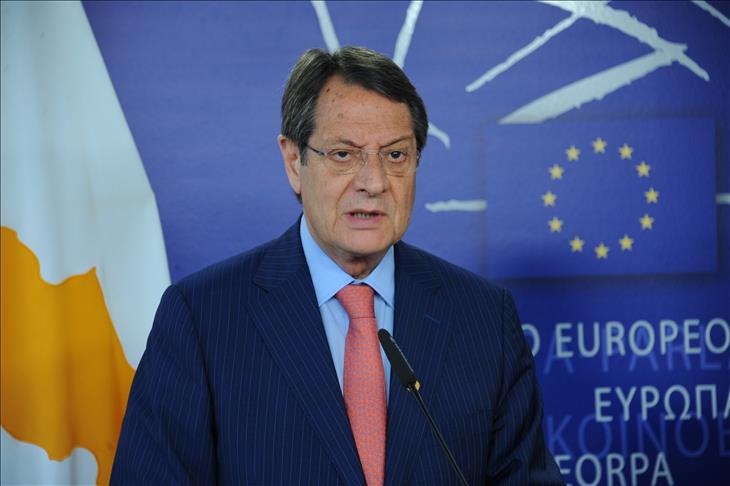
By Ilgin Karlidag
BRUSSELS
Leader of the Greek Cypriot administration, Nicos Anastasiades, has arrived in Moscow for talks with Russian President Vladimir Putin on allowing the Russian military to use air and seaports in the south of the divided eastern Mediterranean island.
Russian news agency Tass reported Wednesday that the Greek Cypriot administration and Russia were planning to sign two documents during Anastasiades' three-day visit, one of which would allow Russian warplanes and warships to use bases on the Greek side of the island for "humanitarian operations and in emergencies."
Anastasiades said an existing cooperation deal between Russia and the Greek Cypriot side involving the maintenance of Russian military equipment sold years ago would also be renewed and updated in Moscow.
He told Tass: "We are in dialogue over providing additional possibilities to Russia in humanitarian operations and in emergencies.
"Simultaneously, two documents on humanitarian issues similar to those that we have with Germany, France and other countries will be signed."
Divisions unveiled
While EU states have appeared in public to be united in terms of sanctioning Russia over the crisis in Ukraine, the Greek Cypriot administration's closer relations with Russia has unveiled divisions within the bloc.
Anastasiades criticized EU sanctions against Russia as being responsible for complicating the economies of many European countries and bringing no prospects to the citizens of Ukraine.
He told Tass: "We have openly said in the Council of Europe that sanctions will not solve the problem.
"Sanctions will only create wider problems for the whole European Union. It turns out that these sanctions will be paid for by the people from the smallest of the countries."
"Our economy and defense are highly dependent on our relations with Russia. Thousands of Russian companies work in [the Greek Cypriot side], we have large investments made by the citizens of Russia," he said.
'Friendly gestures'
Paul Ivan, a political analyst at the European Policy Centre in Brussels, said there were a growing number of voices within the European Union calling for a reduction in the sanctions against Russia.
He said: "Some are coming from Greece, some from [Greek] Cyprus and some from other countries as well.
"Obviously there are (EU) countries that are worried or annoyed by these very friendly gestures towards Moscow."
"This is being seen as critical by many members, but it will depend on how far [Greek Cypriot side] would go on this policy. So far they've played along and I expect them to continue," he added.
The talks in Moscow come after Greek Cypriot administration's top diplomat, Ioannis Kasoulides, two weeks ago denied reports that Russia was seeking to create military bases in the Greek Cypriot administration, which is a member of the European Union but not of NATO.
He said on the sidelines of a meeting of the Foreign Affairs Council in Brussels on Feb. 9: "There is no question of Russian air or naval military bases being on the soil of [Greek] Cyprus."
Anadolu Agency website contains only a portion of the news stories offered to subscribers in the AA News Broadcasting System (HAS), and in summarized form. Please contact us for subscription options.







